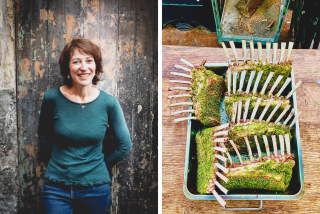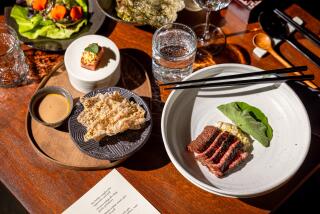The Review: London’s St. John Hotel with chef Fergus Henderson and Dinner by Heston Blumenthal
Every time I’m in London, I somehow manage to find an excuse to eat at St. John Bar & Restaurant. That’s a wonderful rustic restaurant for die-hard carnivores in northwest London from Fergus Henderson, author of the quirky but important cookbook “Nose to Tail Eating.” I didn’t go there this time, but that was only because Henderson and business partner Trevor Gulliver had just opened St. John Hotel on Leicester Square in the West End and I wanted to eat there.
It turns out I wasn’t the only one. This and Dinner by Heston Blumenthal are two of the most sought-after reservations in one of the world’s best eating cities.
St. John is a small hotel with neat, compact rooms. The word “glitzy” could never ever be applied to this place. Understated and plain, the 60-seat restaurant resembles an old-fashioned dining hall, with its white walls, dark wood furniture, coat hooks and simple hanging lights. There’s an open kitchen at the back where cooks work in navy blue striped aprons (the same fabric that Henderson had made into a three-piece suit for himself).
I met up with friends and, though we were six, decided to order a shoulder of suckling pig for four. No worries, this baby could have fed 10. Really. That was after appetizers — stunning plump, juicy snails cooked with thick rashers of bacon, a simple watercress salad, and gentle lamb sweetbreads with bright green fava beans and quartered artichokes.
But that pig! It was a Gloucester Old Spot (the same breed Mozza chef Chad Colby served at a recent family-style pig fest), and the flavor was incredible, the skin crackling, the flesh moist and marbled with sweet pork fat. It came with earthy roasted potatoes. We polished off the meal with an apple shortcake tart with a beguiling bay leaf ice cream.
The one negative aspect to the meal was the wine prices. We had to scour the all-French wine list to come up with something drinkable for less than $50 and ended up drinking a bottle that was not all that exciting.
I ended up going back another evening to try the late-night menu, which starts (starts!) at midnight. So there I was at 1:30 a.m., enjoying a grilled skirt steak slathered in compound herb butter with some amazing “chips” (golden fries cooked in beef drippings) for $27, a bargain in London. Some other folks had the same idea. I looked up from my steak to see the all-star team of Thomas Keller, Daniel Boulud, Grant Achatz and Andoni Luis Aduriz from Mugaritz in Spain troop in for dinner, all in town for the World’s 50 Best Restaurant Awards. (Noma in Copenhagen won for the second year in a row.)
The door opened and in swept Jay Rayner, the Observer’s restaurant critic and former “Top Chef Masters” judge, with a couple of other journalists in tow. A little later, in came chef Bruno Doucet and the crew of La Régalade in Paris, celebrating their seventh year at the iconic Paris bistro.
Really, at that hour I easily could have signed up for one of St. John Hotel’s “post-supper rooms” and skipped the late-night bus ride, but I’m glad I saved the $325 to eat at Dinner by Heston Blumenthal a couple of nights later.
Lest you be confused by the fact that Dinner also serves lunch, the term is defined on the restaurant’s site as “the main meal of the day, taken either around midday or in the evening.”
Blumenthal, of course, is chef-owner of the lauded Fat Duck in Bray outside London and star of the BBC series “Heston Blumenthal: In Search of Perfection.” Dinner at the Fat Duck, if you’re staying in the city, involves the Underground, a train and a taxi to the restaurant — a considerable journey and a considerable bill to experience Blumenthal’s poetic and playful cooking served up in a historic 16th century building.
A meal at the Fat Duck is a lengthy and fascinating affair. But for Blumenthal’s first London restaurant, he’s come up with something more accessible. Dinner is not Fat Duck redux but something equally unique and almost as difficult to describe. At Dinner, Blumenthal dives into the archives of British food history, finds a dish or a concept that interests him and resurfaces to interpret it in his own inimitable way. And though he employs an arsenal of the latest culinary techniques (the Bray restaurant has a dedicated experimental kitchen), here any techno-wizardry is tucked inside and hidden: You’d never know those techniques were used.
The look is glam brasserie with sconces made out of what were described to me as jelly molds, windows overlooking Hyde Park and, very soon, an outdoor terrace in front of that same swath of green. You can’t miss the bright glassed-in kitchen, which is by my reckoning about 100 times larger than the one at Fat Duck, where cooks work shoulder to shoulder in a room the size of a closet. This is a ballroom by comparison.
And your eye goes straight to the massive rotisserie where whole pineapples are turning on vertical spits controlled by a clockwork mechanism. (“The rotisserie was meant for meat but couldn’t hold the weight,” a host mentions as he leads us to a table for two with a view of the goings-on in the kitchen.)
The menu descriptions are straight to the point — roast marrowbone, savoury porridge, rice and flesh, sirloin of Black Angus, poached rhubarb. Each dish lists ingredients and the era of its inspiration, which could be anywhere from 1500 to 1940. Sources are cited at the back of the paper menu.
Meat Fruit (circa 1500) is a good one to share. A board arrives with a couple of slices of grilled bread and what appears to be a mandarin orange, an incredible feat of trompe l’oeil. Cut through the dimpled orange outside to find an ethereal chicken liver parfait, getting a bit of the mandarin-flavored “peel” in each bite. Brilliant.
Hay-smoked mackerel dates from 1730. The fish is lightly brined and smoked, and served with lemon salad and “gentleman’s relish” (a sauce of anchovies with garlic, milk, bread and lemon juice). Broth of lamb (also 1730) features a glorious consommé with sweetbreads, radishes, turnips and a perfect slow-cooked hen’s egg in the middle.
Main courses showcase great products and Blumenthal’s impressive technique. Spiced pigeon from 1680 is so subtly done that no one flavor dominates, each bite of the rosy rare bird playing against quartered artichokes and a gorgeous transparent sauce. That elusive aftertaste is ale.
But the winner is, hands down, a thick pork chop (1860) from a black foot pig served with a Robert sauce and “pointy cabbage” that’s cooked to the perfect point between crunchy and soft. I loved the side of Chantenay carrots glazed with crushed caraway seed and, especially, the astonishing triple-cooked chips (thick-cut fries).
The wine list is excellent and prices aren’t too over-the-top for a luxury hotel restaurant (it’s in the Mandarin Oriental Hyde Park). In fact, for London, Dinner by Heston Blumenthal is surprisingly affordable (remember, London is possibly the most expensive city in the world).
For dessert, I had to have the pineapple from the rotisserie, which has been roasted on the spit for hours. Served alongside is “tipsy cake,” which seems to be a sort of super-divine baba au rhum, only this little cake has been baked in a small cast-iron casserole and injected with liquor and butter while it bakes. The farther down you go, the more suffused with stuff. And that pineapple is beautifully caramelized, possibly the best I’ve ever eaten, utterly transformed by its roasting.
Le Bernardin’s Eric Ripert was having dinner across the room, and, like me, he didn’t seem to be analyzing the food, just enjoying it, which I think is a sign of Blumenthal’s success with Dinner. Who knew this cerebral chef could give us a history lesson in such a delightfully lighthearted way?
Whereas Fat Duck is rooted in imagination and poetry upheld with formidable technique, Dinner looks backward and forward at the same time, cherishing the flavors and dishes that have pleased Englishmen for centuries.
Taken together, these new restaurants are two more reasons why London is one of the most exciting places to eat right now.
London restaurant details
St. John Hotel, 1 Leicester St., London, 3301-8069, https://www.stjohnhotellondon.com. Appetizers, $12.50 to $30; main courses, $30 to $42; desserts, $7 to $13.50.
Dinner by Heston Blumenthal, Mandarin Oriental Hyde Park, 66 Knightsbridge, London, 7201-3833, https://www.dinnerbyheston.com. Appetizers, $21 to $27; main courses, $34 to $60; dessert, $13.50 to $17.
To call from the U.S., dial 011 (the international dialing code), 44 (the country code for Britain) and 20 (city code for London), then the numbers listed above.
More to Read
Eat your way across L.A.
Get our weekly Tasting Notes newsletter for reviews, news and more.
You may occasionally receive promotional content from the Los Angeles Times.






